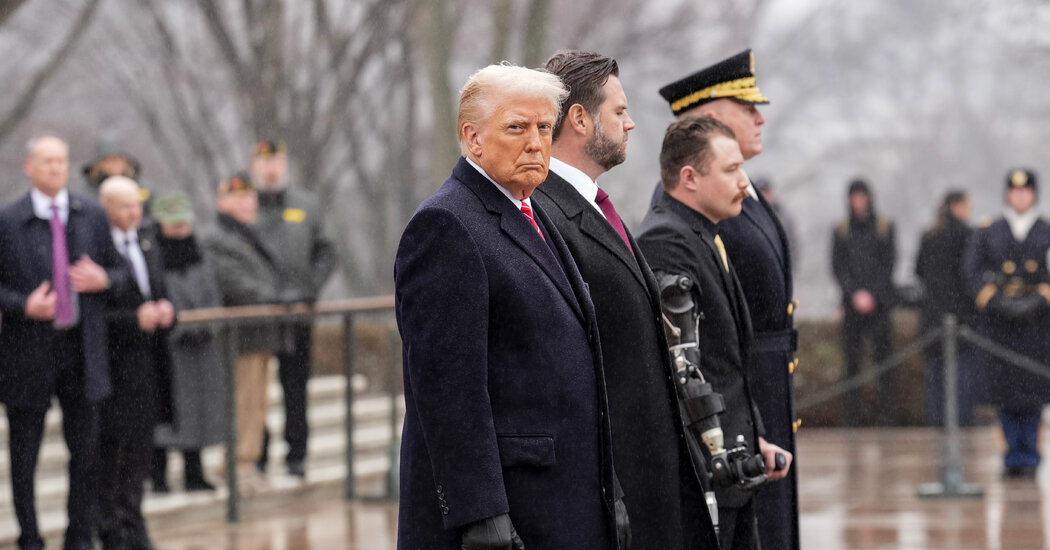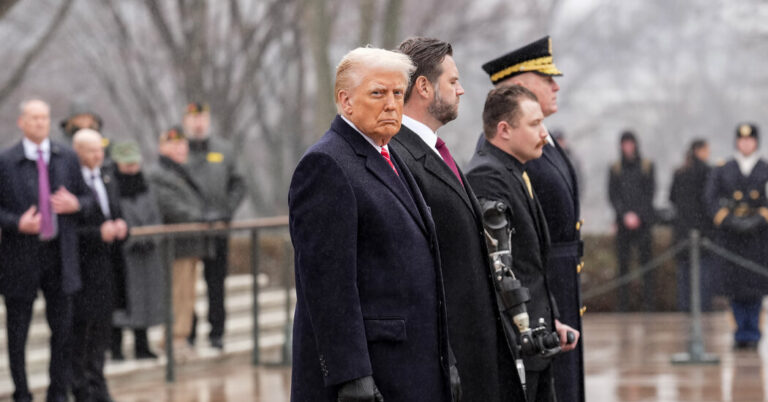President Trump signed an executive order Monday to delay enforcement of the federal TikTok ban for 75 days, though the law took effect Sunday and it’s unclear whether such a move would prevail over it.
The order, one of Trump’s first acts after taking office, instructs the attorney general to take no action to enforce the law so that his administration will have “the opportunity to determine the appropriate course of action to follow “. The order is retroactive to Sunday.
As he signed the order, Trump told reporters that “the United States should have the right to get half of TikTok” if a deal is reached for the app, without going into detail. He said he thought TikTok could be worth a trillion dollars.
The order could immediately face legal challenges, including over whether a president has the power to stop enforcement of a federal law. Companies subject to the law, which prohibits providing services to Chinese-owned TikTok, may determine that the order does not provide a shield from legal liability.
Federal law banning TikTok, owned by ByteDance, required that the app had to be sold to a non-Chinese owner or it would be blocked. The only alternative solution provided by law is a 90-day extension if a probable buyer is found. Again, it is unclear whether this option is viable, given that the law is already in place. The law also limits how much of TikTok’s stake can remain foreign-owned.
By seeking to ignore federal law, Trump has raised serious questions about the limits of presidential power and the rule of law in the United States. Some lawmakers and legal experts have expressed concerns about the legality of an executive order, particularly in the wake of the Supreme Court ruling that upheld the law Friday and the national security concerns that prompted lawmakers to draft it.
Former President Joseph R. Biden Jr. had signed the law, which Congress overwhelmingly passed last year, forcing ByteDance to sell TikTok or face a ban. TikTok had faced security concerns over whether the Chinese government could use it to spread propaganda or collect data on U.S. users. The law imposes fines on app stores and cloud computing providers unless they stop using the app.
TikTok briefly went dark for US users over the weekend, but returned Sunday following Trump’s social media announcement that he was planning an executive order. Although the app worked again for people who had already downloaded it, it disappeared from the Google and Apple app stores on Saturday and remained unavailable on Monday.
Trump’s efforts to keep TikTok online have important implications for its users. The app has reshaped the social media landscape, defined popular culture, and created a livelihood for millions of influencers and small businesses who rely on the platform.
In the executive order, Trump said his constitutional responsibilities include national security. It says it wants to consult with consultants to review the concerns posed by TikTok and the mitigation measures the company has already taken.
The administration will “pursue a resolution that protects national security while saving a platform used by 170 million Americans,” according to the order, which calls the law’s timing “unfortunate.”
The attorney general will send letters to companies covered by the law informing them “that there has been no violation of the statute” and that they will not be held liable for providing services to TikTok during the 75 days, the order said.
That may not be enough reassurance, some legal experts said.
“I don’t think it’s consistent with faithful enforcement of the law to order the attorney general not to enforce it for a certain period,” said Zachary Price, a professor at the College of the Law at the University of California, San Francisco. “And even if that’s good, the president doesn’t have the authority to eliminate the law itself and eliminate accountability for people who violate it while it’s not being enforced.”
TikTok and Apple did not immediately respond to requests for comment. Google declined to comment.
TikTok’s ties to China have long raised national security concerns, including with Trump. Toward the end of his first term in 2020, Trump issued an executive order that would block app stores from making TikTok available for download. He then pushed an American company to buy the app, but his efforts failed when he lost re-election.
Last year, the initiative was taken up by Congress and Biden signed it into law in April. The law targeted app stores, such as those operated by Apple and Google, and cloud computing companies. It said such companies could not distribute or host TikTok unless the app is sold to a non-Chinese owner by January 19.
Mr. Trump then reversed positions. He joined the app in June and said on television in March that there are young people who would go “crazy” without TikTok.
“I guess I have a soft spot for TikTok that I didn’t originally have,” Trump said as he signed the executive orders Monday evening.
TikTok challenged the law in federal court, saying it impeded its users’ rights to free speech, as well as the company’s First Amendment rights. The D.C. Circuit Court of Appeals upheld the law in December. TikTok appealed to the Supreme Court, which upheld the law on Friday.
TikTok and some Democrats made a desperate attempt to block the law from taking effect. But on Saturday, TikTok stopped working in the United States and disappeared from the Apple and Google app stores a few hours before midnight. Users mourned his passing.
On Sunday morning, Trump announced on Truth Social that he will “issue an executive order on Monday to extend the period of time before the law’s prohibitions take effect, so we can make a deal to protect our national security.” It said it would not punish companies that broke the law to keep the app online.
Hours later, TikTok restored service to U.S. users and greeted them with a message: “As a result of President Trump’s efforts, TikTok has returned to the United States!”
As he signed the executive orders in the Oval Office, Trump was asked why he changed his mind about the app.
“Because I have to use it,” he said.
Tripp Mickle and Nico Grant contributed reporting.
Sapna Maheshwari contributed to the reporting





